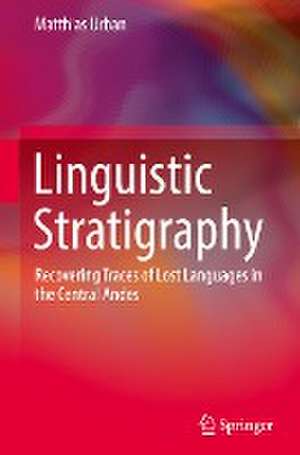Linguistic Stratigraphy: Recovering Traces of Lost Languages in the Central Andes
Autor Matthias Urbanen Limba Engleză Hardback – 30 noi 2023
The author presents a coherent and generally applicable framework for studying prehistoric language shift processes and reconstructing earlier linguistic landscapes before significant language spreads ousted former patterns of linguistic diversity. This framework combines toponymic evidence with the analysis of substrate contact effects, and, in some cases, extralinguistic evidence, to create an integrated if incomplete of extinct and undocumented languages. In an authoritative exploration of case studies, concerning Aymara in parts of Southern Peru, Cañar in Ecuador, and Chacha in Northern Peru, the book shows how the identities of lost languages and earlier linguistic panoramas can be reconstructed.
Preț: 696.35 lei
Preț vechi: 819.23 lei
-15% Nou
Puncte Express: 1045
Preț estimativ în valută:
133.25€ • 139.47$ • 110.90£
133.25€ • 139.47$ • 110.90£
Carte tipărită la comandă
Livrare economică 31 martie-14 aprilie
Preluare comenzi: 021 569.72.76
Specificații
ISBN-13: 9783031421013
ISBN-10: 3031421019
Ilustrații: IX, 147 p. 24 illus., 6 illus. in color.
Dimensiuni: 155 x 235 mm
Greutate: 0.4 kg
Ediția:1st ed. 2023
Editura: Springer Nature Switzerland
Colecția Springer
Locul publicării:Cham, Switzerland
ISBN-10: 3031421019
Ilustrații: IX, 147 p. 24 illus., 6 illus. in color.
Dimensiuni: 155 x 235 mm
Greutate: 0.4 kg
Ediția:1st ed. 2023
Editura: Springer Nature Switzerland
Colecția Springer
Locul publicării:Cham, Switzerland
Cuprins
1. Linguistic stratigraphy, or how to recover traces of lost languages.- 2. The Central Andean linguistic landscape through time and the Quechuan language family.- 3. Evidence and methods for investigating substratal languages.- 4. The Aymara presence in Southern Peru.- 5. The Barbacoan languages and the southern Ecuadorian highlands.- 6. Chachapoyas.- 7. Synopsis and conclusion.
Notă biografică
Matthias Urban is principal investigator of the Junior Research Group “The language dynamics of the ancient Central Andes”, hosted by the University of Tübingen and funded by the German Research Foundation (DFG)’s Emmy Noether Programme. Having held prior appointments at the universities of Leiden, Marburg, and the Max Planck Institute for Evolutionary Anthropology in Leipzig, his research interests include historical linguistics, in particular of the Andes, language contact, and linguistic typology.
Textul de pe ultima copertă
This book examines the historical linguistic panorama of Western South America, focusing on the minor languages that were partially or fully replaced by the expansion of the Quechuan family through the region.
The author presents a coherent and generally applicable framework for studying prehistoric language shift processes and reconstructing earlier linguistic landscapes before significant language spreads ousted former patterns of linguistic diversity. This framework combines toponymic evidence with the analysis of substrate contact effects, and, in some cases, extralinguistic evidence, to create an integrated if incomplete of extinct and undocumented languages. In an authoritative exploration of case studies, concerning Aymara in parts of Southern Peru, Cañar in Ecuador, and Chacha in Northern Peru, the book shows how the identities of lost languages and earlier linguistic panoramas can be reconstructed.
Caracteristici
Provides a coherent framework for studying linguistic stratigraphy Presents three unique case studies about languages that have been replaced by Quechuan languages Shows how to systematically deal with the minor languages of the Andes and elsewhere
